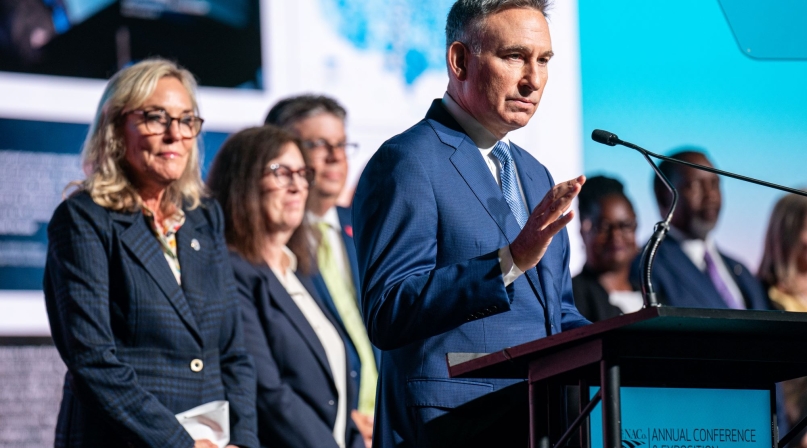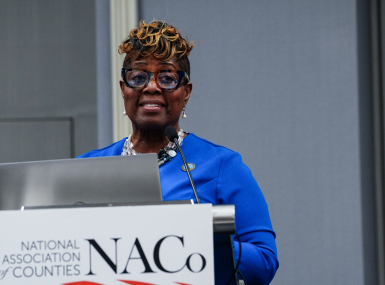Policy priorities to improve mental health unveiled in NACo commission final report

Key Takeaways
The NACo Commission on Mental Health and Wellbeing outlined its policy priorities to improve mental health in its final report unveiled Saturday, July 13 at the Annual Conference.
The 39-page report, titled “From Crisis to Solutions: Policy Catalysts for Improved Outcomes,” explores policy priorities including:
- Amending exclusionary policies under Medicaid
- Enhancing local crisis response systems
- Strengthening the mental health workforce
- Enforcing mental health parity
Members of the commission, who met and examined the issue over the past 18 months, took to the stage at the Opening General Session, flanking the co-chairs who addressed NACo members at the Tampa Convention Center.
Opening General Session
July 13
“The commission, with the support of all of you, has made considerable progress in collaboration with federal, state and community leaders achieving key reforms that will ensure health care benefits for justice-involved youth, improve access to crisis services and align mental health coverage with physical health,” said Los Angeles County, Calif. Supervisor Kathryn Barger, who co-chaired the group.
“We have advanced legislation that would address mental health professional shortages and healthcare disparities through various means such as workforce development, telehealth and community health centers,” she said.
King County, Wash. Executive Dow Constantine, the commission co-chair, also weighed in.
“Commissioner Barger and the commission and I are honored and thrilled to be able to present the commission’s achievements and milestones in this, our final report,” he said. “This report emphasizes crucial data, effective strategies and recommendations for government at all levels.”
“It also encourages federal policymakers, local leaders and stakeholders to back and execute policy reforms that boost local capabilities to tackle this crisis,” Constantine said.
“These reforms include eliminating federal restrictions on Medicaid benefits for incarcerated individuals; streamlining resources to establish crisis call centers and improve crisis response infrastructure; encouraging and enforcing parity policies across all insurers and all providers.”
Other policy reforms suggested in the report, he said, include “establishing career paths for behavioral health professions, particularly in underserved areas and augmenting funding for improvement of an ample and representative workforce.”
“It takes people to treat people,” he noted.
“We’ve made substantial progress in promoting our priorities for mental health service and policy reform, but there is a lot more to accomplish,” he said.
“As the formal work of this commission closes, we implore all county leaders to leverage this report, leverage the work we’ve been doing, and take the lead in tackling mental health issues in every community.”
Watch
The NACo Commission on Mental Health and Wellbeing releases findings and recommendations at the 2024 NACo Annual Conference.
Resource
From Crisis to Solutions: Policy Catalysts for Improved Outcomes

Related News

National Association of Counties Launches Initiative to Strengthen County Human Services Systems
The National Association of Counties (NACo) announces the launch of the Transforming Human Services Initiative, a new effort to help counties modernize benefits administration, integrate service delivery systems and strengthen county capacity to fulfill our responsibility as America’s safety net for children and families.

Congress seeking ‘common-sense solutions’ to unmet mental health needs
Rep. Andrea Salinas (D-Ore.): “Right now, it is too difficult to access providers … and get mental health care in a facility that is the right size and also the appropriate acuity level to meet patients’ needs.”

Prince William County transforms crisis care through "No Wrong Door" approach
Prince William County, Va.’s Crisis Receiving Center is bridging the gap between emergency room care and traditional outpatient care in behavioral crisis response and reducing burden on local law enforcement and hospitals.
